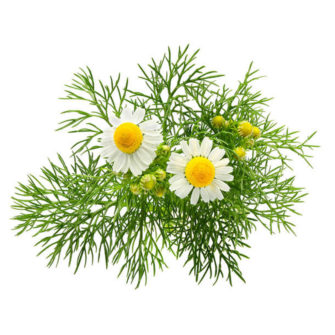Chamomile is a flowering plant that is widely used as a tea or an oil for its medicinal properties. You can find this herb in many forms, including liquid extract, tea bags, infusions, or essential oil. It typically has a pungent smell and taste with notes of apple and sometimes citrus. Chamomile can be used as an expectorant, in remedies for coughs and bronchitis, and as a sleep aid. It is also used as a topical treatment for wounds, eczema, dermatitis and dermatologic conditions such as psoriasis.
Although there is much controversy regarding the efficacy of chamomile, it is still widely used as tea and/or oil to treat a variety of medical conditions.
Chamomile Uses
Chamomile has been used as a treatment for many medical conditions including digestive issues such as peptic ulcers and irritable bowel syndrome (IBS). Chamomile has also been used as a folk remedy for many other conditions including anxiety and insomnia. In a study using people with mild to moderate depression, chamomile was found to be significantly more effective than placebo when treating this condition.
Chamomile has also been reported in the treatment of many other medical conditions, these include:
- Anxiety
- Bronchitis
- Coughs and colds
- Depression
- Eczema and dermatitis
- IBS
- Insomnia
- Menstrual cramps
- Migraines and headaches
- Psoriasis
- Ulcers
- Wounds
Side Effects of Chamomile
An overdose of chamomile may cause stomach irritation and constipation. Side effects may also include:
- allergic skin rashes
- sleep disturbances and restlessness
- vomiting
- dizziness.
Contraindications Related to Chamomile
- Chamomile is safe for most people when taken in moderation. People with allergies to ragweed, chrysanthemums, marigolds and daisies should avoid using this herb.
- Very large doses of chamomile may lower blood sugar levels and cause otherwise non-diabetic people to develop type 2 diabetes.
- Chamomile is not safe for use during pregnancy or breastfeeding as it could cause uterine contractions and miscarriage.
- Chamomile is not safe for use in people with a history of estrogen-sensitive cancer such as breast cancer because it contains compounds that mimic the effects of estrogen.
- Chamomile is not safe for use in people with gallstones or biliary tract blockages.
- Chamomile is not safe for use in people taking any medications that suppress the immune system, people using immunosuppressant drugs, or anyone being treated for a serious disease such as AIDS or cancer.
- Chamomile is not safe for use in people with a history of allergies, liver disease, kidney disease, or diabetes.
- Chamomile is not safe for use in people who are taking any medications that have an effect on the brain or nervous system including antidepressants and heart medications.
Origins of Chamomile
Chamomile is native to the Mediterranean and Asia and can be found growing as a wild herb or commercially cultivated.
My Favorites
- No Favorites Yet

